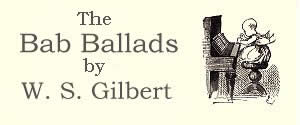You are here: > > An Unfortunate Likeness
An Unfortunate Likeness
I’ve painted SHAKESPEARE all my life —
The bard play-writing in his room, |
 |
The bard a tradesman — and a Jew —
The bard a botanist — a beak —
The bard a skilled musician too —
A sheriff and a surgeon eke!
Yet critics say (a friendly stock)
That, though with all my skill I try,
Yet even I can barely mock
The glimmer of his wondrous eye!
One morning as a work I framed,
There passed a person, walking hard:
“My gracious goodness,” I exclaimed,
“How very like my dear old bard!
“Oh, what a model he would make!”
I rushed outside — impulsive me! —
“Forgive the liberty I take,
But you’re so very” — “Stop!” said he.
“You needn’t waste your breath or time, —
I know what you are going to say, —
That you’re an artist, and that I’m
Remarkably like SHAKESPEARE. Eh?
"You wish that I would sit to you?”
I clasped him madly round the waist,
And breathlessly replied, “I do!”
“All right,” said he, “but please make haste.”
I led him by his hallowed sleeve,
And worked away at him apace,
I painted him till dewy eve, —
There never was a nobler face!
“Oh, sir,” I said, “a fortune grand
Is yours, by dint of merest chance, —
To sport his brow at second-hand,
To wear his cast-off countenance!
“To rub his eyes whene’er they ache —
To wear his baldness ere you’re old —
To clean his teeth when you awake —
To blow his nose when you’ve a cold!”
His eyeballs glistened in his eyes —
I sat and watched and smoked my pipe;
“Bravo!” I said, “I recognise
The phrensy of your prototype!”
His scanty hair he wildly tore:
“That’s right,” said I, “it shows your breed.”
He danced — he stamped — he wildly swore —
“Bless me, that’s very fine indeed!”
“Sir,” said the grand Shakespearian boy
(Continuing to blaze away),
“You think my face a source of joy;
That shows you know not what you say.
“Forgive these yells and cellar-flaps,
I’m always thrown in some such state
When on his face well-meaning chaps
This wretched man congratulate.
“For, oh! this face — this pointed chin —
This nose — this brow — these eyeballs too,
Have always been the origin
Of all the woes I ever knew!
“If to the play my way I find,
To see a grand Shakespearian piece,
I have no rest, no ease of mind
Until the author’s puppets cease!
 |
“Men nudge each other--thus--and say, “In church the people stare at me, |
“And sculptors, fraught with cunning wile,
Who find it difficult to crown
A bust with BROWN’S insipid smile,
Or TOMKINS’S unmannered frown,
“Yet boldly make my face their own,
When (oh, presumption!) they require
To animate a paving-stone
With SHAKESPEARE’S intellectual fire.
‘At parties where young ladies gaze, “Whene’er I speak my soul is wrung |
 |
“I should not thus be criticised
Had I face of common wont:
Don’t envy me--now, be advised!”
And, now I think of it, I don’t!
- 1. “Go with me to a notary — seal me there
Your single bond” - — Merchant of Venice, Act I., sc. 3.
- 2. “And there she shall, at Friar Lawrence’ cell,
Be shrived and married.” - — Romeo and Juliet, Act II., sc. 4.
- 3. “And give their fasting horses provender.”
- — Henry the Fifth, Act IV., sc. 2
- 4. “Let us, like merchants, show our foulest wares.”
- — Troilus and Cressida, Act I, sc. 3
- 5. “Then must the Jew me merciful.”
- — Merchant of Venice, Act, IV, sc. 1
- 6. “The spring, the summer,
The childing autumn, angry winter, change
Their wonted liveries.” - — Midsummer Night’s Dream, Act IV, sc. 1
- 7. “In the county of Glo’ster, justice of the peace and coram."
- — Merry Wives of Windsor, Act I, sc. 1
- 8. “What lusty trumpet thus doth summon us?”
- — King John, Act V, sc. 2
- 9. “And I’ll provide the executioner.”
- — Henry the Sixth (Second Part), Act III, sc. 1
- 10. “The lioness had torn some flesh away,
Which all this while had bled.” - — As You Like It, Act IV, sc. 3
| |
Page modified 29 July, 2011
